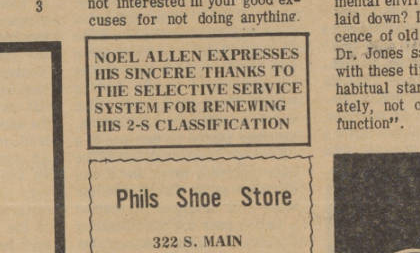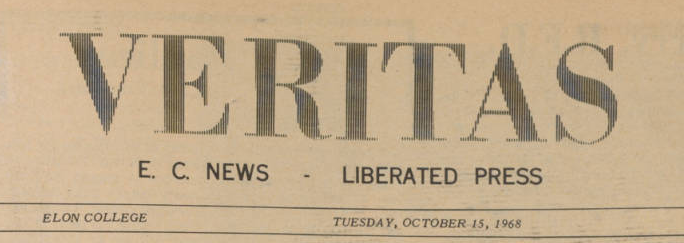Veritas: The “liberated” Elon College Newspaper
Shannon Tennant
March 28, 2014
The late 1960s were a time of turmoil on college campuses, and Elon was no exception. Serious issues such as the Civil Rights movement and the Vietnam War polarized public opinion in the United States. Rock and roll, “hippies” with long hair, and women’s changing roles were exciting new trends or the end of civilization, depending on your point of view.
Elon had possessed a student newspaper since its earliest days. The Maroon and Gold was founded in 1919 to replace the defunct Elon College Weekly. Though initially independent, by the 1960s the paper was financially supported by the college and produced by a for-credit journalism class. Distrust of the college administration and concerns about censorship prompted a group of students in the Student Government Association to found a “liberated” newspaper. They called it Veritas, meaning truth.
The Veritas was published for three semesters, between fall 1968 and fall of 1969. The four-page newspaper was supported financially by the SGA using student fees as well as through advertising revenue, and thus not directly by the college administration. Noel Allen, the SGA president from 1968-69, was the paper’s first publisher. The paper aimed to be “a valve which will open rapport” and promised to open the “Letters to the Editor” section to any student, faculty, or administrator without censorship.
During the first year, the paper followed a standard format. There were reports on the activities of the Student Senate and SGA events such as Homecoming, the Talent Show, the Elon Players theater group, and the Lyceum. Page three was devoted to sports and there were usually several stories about happenings at other national colleges and universities. Much of the paper was opinion rather than news. Regular columns included “Publicus,” which addressed political issues of the day such as the contentious 1968 national election. There was a column about African-American issues, called “Dear Beverly Axelrod,” which was named for the attorney for the Black Panthers. “Culture High” reviewed new music and movies, such as Janis Joplin and the Beatles.
The writers of the Veritas called for change in several aspects of campus life and policy, which reflected changes in broader society. One of the most heated issues was the mandatory attendance of chapel. Students were required to attend chapel at least once a week until May 1969. During 1968-69, students earned attendance points for going to chapel or lectures. If the requirement was not met, the students were not permitted to graduate. Another controversial issue raised by Veritas was the rules governing female students. Women living in the dorms had to sign out if they left their dorms and had a strict curfew. There were also room checks by counselors and house-mother to ensure that beds were made and rooms were tidy. Women who violated any of the rules were confined to their rooms. Needless to say, these policies applied only to the female students, not the male students. (The feminist call for equal rights contrasts with several news stories of a “panty raid” led by male students to the women’s dormitory which appear in the same papers.)
The conflict in Vietnam had escalated by 1968, and students at Elon were concerned. Male college full-time college students were eligible for a draft deferment (see picture),  but everyone knew people who were fighting in what was increasingly seen as an immoral, senseless war. Tuesday October 15, 1968 was selected as a day of national protest about the war. The college administration refused to cancel classes but permitted a peaceful demonstration. Professor Michael Smith cancelled class anyway, and was suspended. The Veritas provided not only coverage of the protest but was vehement in its defense of Professor Smith and its dissatisfaction with the administration’s stance. Professor Smith’s suspension was ultimately reversed, and the conflict died down during the spring of 1969.
but everyone knew people who were fighting in what was increasingly seen as an immoral, senseless war. Tuesday October 15, 1968 was selected as a day of national protest about the war. The college administration refused to cancel classes but permitted a peaceful demonstration. Professor Michael Smith cancelled class anyway, and was suspended. The Veritas provided not only coverage of the protest but was vehement in its defense of Professor Smith and its dissatisfaction with the administration’s stance. Professor Smith’s suspension was ultimately reversed, and the conflict died down during the spring of 1969.
Fall of 1969 brought new challenges to the Veritas. The newspaper’s permission to share the Colonnades office in the student center was revoked and the paper was told that there was no other space available. The administration also withheld the SGA’s funds for much of the fall semester. A student submitted a petition that the SGA had misused funds, and the charge was investigated by an outside auditor. The SGA was cleared of wrongdoing and the funds were released later in the year. But this combination of circumstances proved too much and the paper printed its last issue on November 11, 1969.
The title “Veritas” was used by another paper in the spring of 1970. A group of students, unaffiliated with SGA or the administration, printed several issues of a newsletter to protest the decision not to renew Professor Michael Smith’s contract. Professor Smith himself wrote for the paper. Other issues addressed were the incompetence of the SGA, the racism and prejudices of certain named faculty members, and the women’s dormitory rules. This paper was not merely critical of the college administration but used obscene language and personal attacks on faculty and administrators. The editor and three other staff members were brought up before the Honor Court and put on probation.
The end of the Veritas (both Veritas papers) presaged the temporary suspension of all student media at Elon. The Maroon and Gold finished out the 1969-70 school year and was then discontinued by the administration, citing budgetary reasons. Student events were advertised in a newsletter from the college’s public relations office. Not until four years later, in October 1974, was student journalism revived with the founding of The Pendulum.
The passage of time changes our perspective of those days. It seems inconceivable today that Elon could support different rules for women students or that students would be penalized for the lack of traditional Christian religious observance. And distance has certainly changed attitudes to the Vietnam War and those who protested it. The Veritas writers who were so radical in 1968 were able to see that many of the changes they demanded were eventually implemented. In fact, Noel Allen, the SGA president who founded the Veritas and stirred up so much controversy, came back to Elon to work with the administration as a member of the Board of Trustees in 1985 and was awarded Elon’s Distinguished Alumnus of the Year award in 2008.
You can read issues of the Veritas and other Elon student newspapers online in the North Carolina Newspapers collection.

Leave a Reply